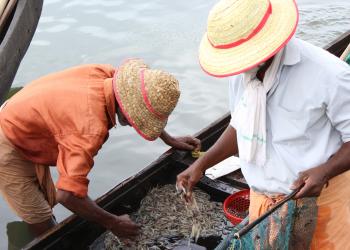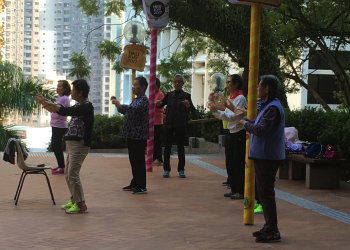News & Stories
2019

News
Germaphobia Doesn't Wash Healthwise
A recent Consumer Council survey has found that only two out of eight tested anti-bacterial handwash products can live up to their claims of having 99.9 percent efficacy in killing germs, sparking worries amongst the public.
Advertisements often imply that bacteria in homes are harmful and must be eliminated by using any antibacterial or antimicrobial products available.
However, Boston University's School of Public Health suggests only about 5 percent of bacterial species are disease-causing, in other words pathogenic.
In fact, the pursuit of a germ-free environment is futile.
Some bacteria are just impossible to eliminate with chemicals in the cleansing agents, or at the concentrations level of the chemicals we are commonly using.
Even the so-called 99.9 percent efficacy must rely on perfect usage of the product.

News
Let's Make A Start Toward Cleaner Society
The recent Extinction Rebellion movement in the UK protested against climate breakdown, biodiversity loss and the risk of social and ecological collapse.
Protesters called for policies that can achieve a net zero carbon footprint by 2025, one of the 17 sustainable development goals agreed by world leaders at the United Nations in 2015.
Meeting these goals requires more than addressing climate change.
Sustainable development is a balance between the needs of the environment, society and economy in order to maintain a quality standard of life for both present and future generations.
Many countries, including the UK, have implemented goal-specific measures in a bid to achieve the 17 goals, with voluntary national reviews to see if the measures are effective.

News
Let's Get Going on Road to Cleaner Air
Air pollution is a major environmental and health concern in Hong Kong and the largest environmental health risk, according to the World Health Organization, tying it to seven million premature deaths globally in 2016. Yet many of us accept it as part of city living.
In a bid to help city dwellers take their health into their own hands, HKUST's Institute for the Environment recently launched a game-changing mobile app that lets users monitor air quality to reduce their exposure to air pollution.
Titled PRAISE-HK (Personalized Real-time Air-quality Informatics System for Exposure), the app provides real-time air quality and health risk information and forecasts, down to the street you are at, up to two days in advance, helping Hongkongers live a smarter and healthier life.
One of the world-leading technologies behind the app is our dynamic transport modeling.

News
Treading Water on Sustainable Fisheries
Our fishery gave birth to a love of seafood, but it is also contributing to the global fish stocks decline.
We degraded it through overfishing, pollution and reclamation before building a fleet to ravage fisheries in other places.
Many cities have actually done the same. Ironically, calls to save global fish stocks come from cities that sacrificed their own fisheries.
Yet, Hong Kong also shows the way to a solution. It retains a resilient population of people who fish, those with the expertise and toughness to build a sustainable fishery, that is, such as those where catch volume and fishing practices allow for continual regeneration of stock, while enabling fishers to achieve a decent standard of living.
People in the industry will overfish and abuse the ecosystem to provide more income if they can't afford a living.
But our highly adaptable fishermen can demonstrate a global model for sustainable fishery.

News
Sense of Community Central Elderly Focus
By Miao Jia, Research Assistant Professor of Division of Social Science, HKUST
By 2064, Hong Kong's number of elderly (aged 65 and older) will reach 2.58 million, accounting for 36 percent of the population.
Today this percentage stands at 16, with one third of the elderly living in poverty.
These staggering figures pose severe challenges to our society, thus studying the well-being of Hong Kong's elderly is vital to developing the right solutions.
Since 2010, our Center for Applied Social and Economic Research team at HKUST has been conducting surveys of 3,200 families, 7,200 adults and 950 children every two years (The Hong Kong Panel Study of Social Dynamics), looking into how our society is transformed over time and how various government and social policies are influencing families.

News
Testing Times in Era of DNA Mapping
By Dr. Zhao Yongqian, Research Assistant Professor of Division of Life Science, HKUST
A few weeks ago, the Department of Health advised the public not to purchase genetic mapping tests on their own because it is hard to ascertain their professional standard and quality after a political party openly accused eight firms offering such tests of exaggerating claims that they are able to identify children's talents and character traits.
Actually, genetic testing is rather novel in science, having only appeared less than a century ago.
As early as 1940s, scientists began to learn that genetic information about living things was carried by DNA.
Until 1975 when British scientist Frederick Sanger invented a DNA sequencing technology, "Sanger sequencing", humans recognized the nature of biological inheritance at the molecular level.

News
Let's Clear the Fog over Central Tolls
By Lo Hong-kam, Head and Chair Professor of Civil & Environmental Engineering, HKUST
Hong Kong is no stranger to traffic congestion and the government has mulled over introducing electronic road pricing in Central since the 1980s and public engagement over ERP was completed in 2016, but some vocal stakeholders, mainly private vehicle owners, have stymied such plans for decades.
I believe both policymakers and the media have failed the public by centering discussions on how a potential ERP system would impact on private car users when they are the minority in using the transportation system.
Only 10 percent of trips in Hong Kong use private cars and the rest rely on public transportation.
Let me explain why implementing ERP in Central would bring positive impact to the traveling public.

News
Here's a Drink to Acid Test for Pseudoscience
By Jason Chan, Lecturer, Department of Chemistry, HKUST
Science is hailed by modern society as an academic discipline of strict moral grounding and high integrity.
Almost every one would place some degree of trust in scientific studies as they are deemed to represent knowledge derived from empirical evidence gathered through meticulous experiments.
Given its high social status, there is no doubt that people would feel inclined to trust a product or service backed up by scientific studies or claims.
Unlike medical products and services that are tightly regulated by civil authorities, commercial use of scientific claims is less severely vetted.
This has created a grey area for pseudoscientists, who devise clever scams that have the appearance of science but are full of errors and lies.
One can learn well from a few recent (and still ongoing) examples - the alkaline diet and alkaline water scam.






